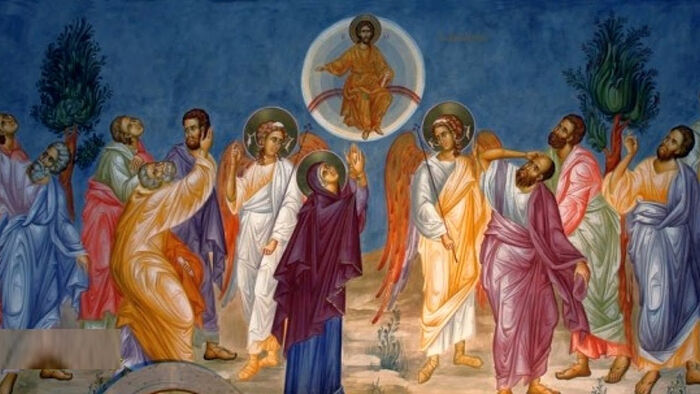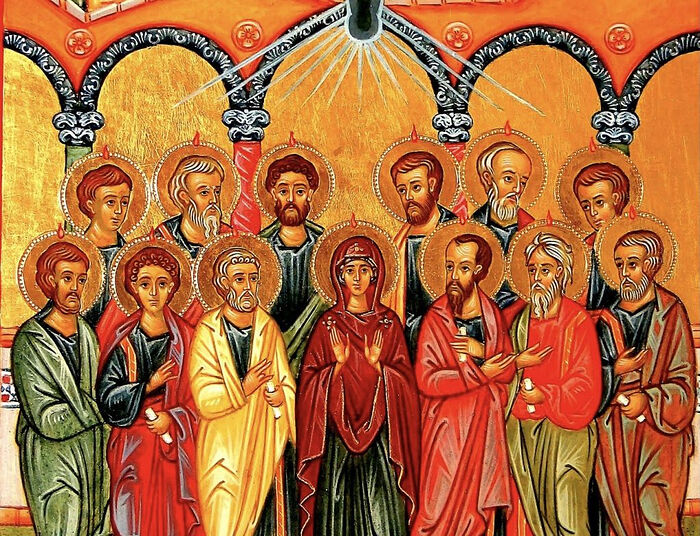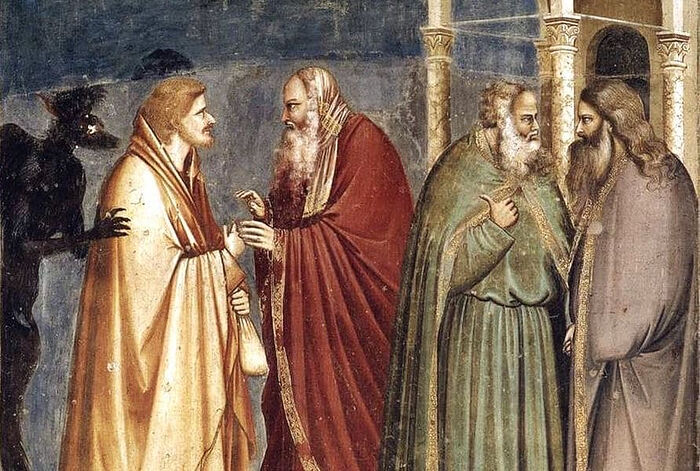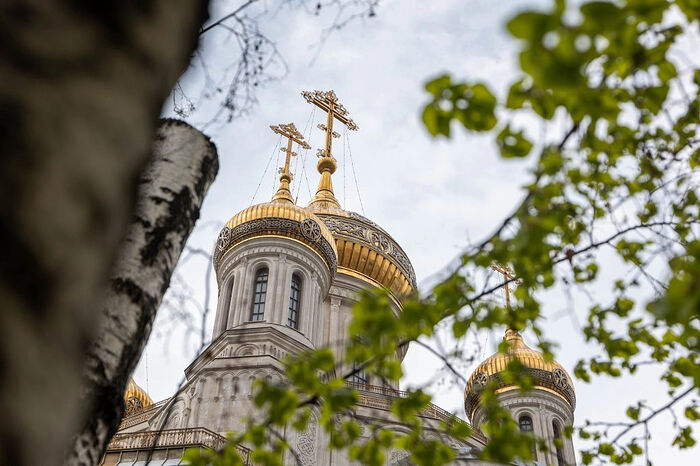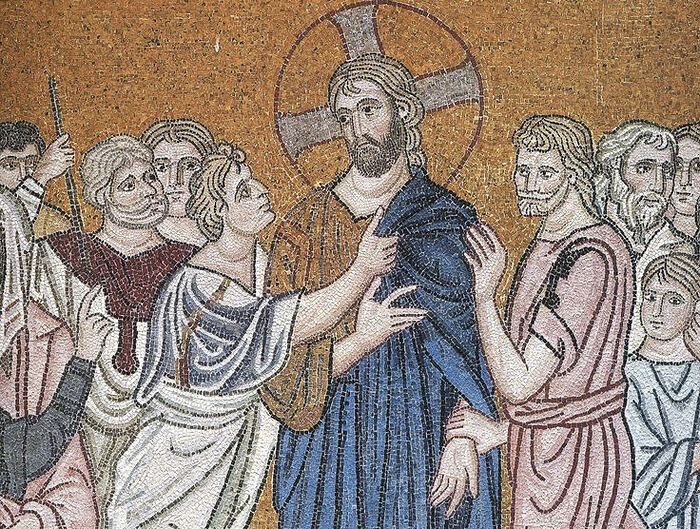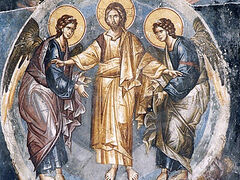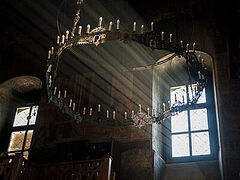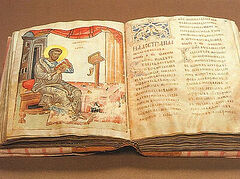A new project of the Spiritual-Educational Center of Sretensky Monastery on the study of Sacred Scripture, conducted by the well-known catechist Sergei Komarov, has begun. We will be discussing the book that begins the liturgical collection of the Apostolic epistles—the Acts of the Holy Apostles.
1:12 Then returned they unto Jerusalem from the mount called Olivet, which is from Jerusalem a Sabbath day’s journey.
There’s a prophecy of Zechariah about the Mount of Olives as the place of the coming of the Messiah: Then shall the Lord go forth, and fight against those nations, as when He fought in the day of battle. And His feet shall stand in that day upon the Mount of Olives, which is before Jerusalem on the east (Zech. 14:3-4).
The mountain is located half a mile east of the Temple, the distance of a Sabbath’s day journey. A Sabbath day’s journey is the number of steps a Jew could take on a Saturday—a distance of about half a mile to a mile.
1:13 And when they were come in, they went up into an upper room, where abode…
The upper room is the upper part of a Jewish house. Presumably, this is the house of the Apostle Mark. Usually, there were upper rooms only in rich houses. The owners loved to hold crowded meetings in their spacious upper rooms. However, in some Palestinian houses, the upper room was sometimes just an attic.
… both Peter, and James, and John, and Andrew, Philip, and Thomas, Bartholomew, and Matthew, James the son of Alphaeus, and Simon Zelotes, and Judas the brother of James.
There are various lists of the Apostles in various places of the New Testament. The order of the Apostles and the pairings change; they can be called by different names. People often had two names in those times, and they used either or.
As we see, there’s no more Judas Iscariot here. There are eleven Apostles instead of twelve.
1:14 These all continued with one accord in prayer and supplication…
What’s the difference between “prayer” and “supplication?” St. Ignatius (Brianchaninov) offers this interpretation: “’Prayer’ hear means those prayers that are performed together, while ‘supplication’ means the constant prayerful direction of their spirit—unceasing prayer.”
The Apostles were told to wait for a revelation from above, and they prayed in anticipation of this event. Prayer is their constant state. And maybe “prayer” means prayer in general, while “supplication” means particular petitions.
… with the women, and Mary the Mother of Jesus, and with His brethren.
Remember that Christ had four either step-brothers or cousins: James, Joses, Simon, and Jude. They didn’t believe in Him before His Resurrection. But they obviously came to believe by the time of Pentecost. One of the brothers of Christ—James—later became the first bishop of Jerusalem, and Jude—the second, after the death of James. This is what our Tradition says.
1:15 And in those days Peter stood up in the midst of the disciples, and said…
Peter is the leader of the community. It’s interesting that even after he denies Christ, he maintains this leadership. He repented, and Christ restored him to the Apostolic dignity, telling him in front of everyone: Feed My sheep (Jn. 21). That’s why he was so bold. Peter is the mouth of the Apostolic community.
… (the number of names together were about an hundred and twenty,)
These weren’t all the Christians at that moment. In his Epistle to the Corinthians, the Apostle Paul says that even before His Ascension, Christ appeared to more than 500 brethren at one time. There were more disciples of Christ, it’s just that there were 120 gathered in Jerusalem at that time.
1:16 Men and brethren!
Such a solemn address means that Peter wants to say something important.
This Scripture must needs have been fulfilled, which the Holy Spirit by the mouth of David spake before…
This is about the Psalter, affirming its Divine inspiration. The Psalter was written by the Holy Spirit through David.
… concerning Judas, which was guide to them that took Jesus.
1:17 For he was numbered with us, and had obtained part of this ministry.
1:18 Now this man purchased a field with the reward of iniquity…
Interestingly, Judas didn’t purchase this land. He received money, threw it into the Temple, and then the Jewish elders bought the land with this money. But Peter omits all the details, abbreviating the story of Judas to one thesis. Those listening understood what he was talking about.
… and falling headlong, he burst asunder in the midst, and all his bowels gushed out.
The Gospels say that Judas hanged himself, and here it says that he [fell] headlong, he burst asunder in the midst, and all his bowels gushed out. St. Papias of Hierapolis, a second-century Christian theologian, combined these details into one: Judas hanged himself, then fell and split his stomach on the rocks. And this is what the Church believes to this day.
1:19 And it was known unto all the dwellers at Jerusalem; insomuch as that field is called in their proper tongue, Aceldama, that is to say, The field of blood.
1:20 For it is written in the book of Psalms, Let his habitation be desolate, and let no man dwell therein—this is a quote from Psalm 68:26—and his bishoprick let another take—this is from Psalm 108:8.
David wrote these psalms when Saul was at enmity with him. Psalm 68 is about Saul and his entourage, and the Psalm 108 is about Saul and his servant Doeg, who was in charge of Saul’s cattle. Doeg betrayed David, and it’s about him that David says, and his bishoprick let another take. In the end, Doeg was indeed killed and his position was taken over by another.
If we literally translate from Hebrew, it would say and let another take his “dignity,” but here we have a case where translation means interpretation. Although it would literally be “dignity,” you can also say “episcopal dignity,” or “bishoprick.”1
The Psalter is understood by the Church on four levels. The first level is the historical, when David writes about some situation in his life, asking God to deliver him from enemies. The second level is the Messianic. Almost all of David’s Psalms are Messianic. David himself is a type of the Lord Jesus Christ. It’s no coincidence that Christ often speaks in the words of David from the Psalms. For example, on the Cross: Why hast Thou forsaken Me? (Mt. 27:46, Mk. 15:34), “Lord, receive My spirit” (cf. Lk. 24:36). Or in the services, at Matins, we sing: All of the nations surrounded me; in the name of the Lord I cut them off! (Ps. 117:10). The Holy Fathers put these words in the mouth of Christ, presenting Him praying on the Cross with these words. In the mystical sense, David describes the suffering Messiah. Although he talks about himself, with his prophetic intuition he portrays Christ. In the historical sense, the words, All of the nations surrounded me; in the name of the Lord I cut them off, refer to David and his enemies, but at the same time, he refers to the suffering Lord, Who could also say these words. This placing of the words of David into the mouth of Christ is constantly present in the thought of the New Testament.
The third level of the interpretation of the Psalter is ecclesiastical, or ecclesiological. Let’s dwell again on the words, All of the nations surrounded me; in the name of the Lord I cut them off. The Church sings this about Christ and about itself, because the Church is the Body of Christ. Everything that applies to Christ also applies to the Church.
The Church, in fact, continues the path of Christ on Earth. Christ preached, and the Church preaches. Christ was persecuted, and the Church is always persecuted. Some heard Christ, and there will always be those who hear the Church. Christ healed people both spiritually and bodily, and the Church heals spiritually and bodily. Christ resurrected people, and the Church spiritually resurrects, and sometimes bodily too. The Church is the Body of Christ—it is Christ Himself.
Therefore, the Church applies the words of Christ to itself, including from the Psalter. And the Church sings All of the nations surrounded me; in the name of the Lord I cut them off constantly, because it also has detractors, and the Church’s sole weapon is prayer: In the name of the Lord I cut them off.
The fourth level of interpretation is personal. Everything that’s said in the Psalter is about our Christian life. When we read the Psalter at home, we apply it all to ourselves. And we can say: All of the nations surrounded me; in the name of the Lord I cut them off. Only, our enemies are spiritual—the demons and our sinful feelings and desires, which we must fight against. For we wrestle not against flesh and blood, but against principalities, against powers, against the rulers of the darkness of this world, against spiritual wickedness in high places (Eph. 6:12).
So, here’s the pattern we have. David is a type of Christ. The Church is the Body of Christ. We must become “christs” by grace; we must imitate the Lord. Imitate me, just as I also imitate Christ (1 Cor. 11:1). Let this mind be in you, which was also in Christ Jesus, says the Apostle Paul (Phil. 2:5). We must imitate our Lord, because we Christians are His followers. We are the Church, and the Church is the Body of Christ, and David is a type of Christ.
The Psalter is a unique book in this respect. It connects us with Christ, with the Bible, with sacred history. This is why it became the main prayer book of the Church. By the way, in Acts 4, when it’s describing how the Apostles were first arrested for preaching the Gospel, and after their arrest, Sts. Peter and John return to the community and pray, the Disciples pray the words of the Psalter: And when they heard that, they lifted up their voice to God with one accord, and said, Lord, Тhou art God, Which hast made Heaven, and Earth, and the sea, and all that in them is: Who by the mouth of Тhy servant David hast said, Why did the heathen rage, and the people imagine vain things? (Acts 4:24-25).
This is a quote from Psalm 2: Why have the heathen raged, and the people meditated empty things? The kings of the Earth were aroused, and the rulers were assembled together, against the Lord, and against His ChristThe kings of the earth rose up and the rulers gathered together against the Lord and His Christ.
Christ has already resurrected and ascended, He was no longer there with the Apostles, therefore the Christian community talks about itself, about the Church. And further, in confirmation:
For of a truth against thy holy Child Jesus, Whom Thou hast anointed, both Herod, and Pontius Pilate, with the Gentiles, and the people of Israel, were gathered together, For to do whatsoever Thy hand and Thy counsel determined before to be done. And now, Lord, behold their threatenings: and grant unto Thy servants, that with all boldness they may speak Thy word (Acts 4:27-29), that is, they apply it to themselves. Pilate and Herod opposed Christ in their time, but now the Apostles are talking not about Christ, but about themselves, about the Apostolic community, about the Church. The Apostles were arrested, and they as if say: “You’ve come out against Christ!” that is, against us, because we are Christ.
But let’s return to the text of the first chapter.
1:21 Wherefore of these men which have companied with us all the time that the Lord Jesus went in and out among us,
1:22 Beginning from the baptism of John, unto that same day that he was taken up from us, must one be ordained to be a witness with us of His Resurrection.
It doesn’t directly tell us where the idea of choosing a twelfth Apostle to replace Judas comes from. St. Peter refers to the words of the Psalm: and his bishoprick [dignity] let another take. But, of course, God Himself gave them this idea: The Church had to restore the assembly of the Twelve.
Twelve, the number of the Old Testament tribes of Israel, symbolizes the fullness of the Church. The assembly of the Twelve Apostles was supposed to reflect the fact that the Christian community represents the true remnant of Israel that has remained faithful to God. As the Israelite people descended from the Twelve Patriarchs, so the New Israel, the Church, has its origin in the Twelve Apostles.
The necessary condition for restoring the Apostolic number, or rather, the requirement for the candidate is that he was to have walked with Christ the whole time, from the beginning of the Savior’s preaching until the end. The testimony of eyewitnesses was given great importance in antiquity.
1:23 And they appointed two, Joseph called Barsabas, who was surnamed Justus, and Matthias.
Only two people met the Apostolic requirements: Justus and Matthias. Just imagine how many people were with Christ, how many He healed! But those who were with him the whole time—two people, not including the Eleven.
This is a ratio that hasn’t changed to this day. A huge number of people revolve around Christ and the Church, but those who are with Christ throughout their lives (in the spiritual sense) are very few.
However, we don’t really know exactly how many people were found who met the Apostles’ requirements. Perhaps they found more but only “appointed” two for the drawing of lots. There’s also the question of where the Seventy Apostles were at this time. Either they were dispersed at this time, or Justus and Matthias were simply chosen from this number.
Note that Matthew and Matthias are different Apostles, though they’re sometimes confused.
So, the Apostles don’t dare to choose the twelfth Apostle themselves. God must choose.
1:24 And they prayed, and said, Thou, Lord, Which knowest the hearts of all men, shew whether of these two Thou hast chosen—how wonderful! The Apostles have such lively conversation with God!
1:25 That he may take part of this ministry and apostleship, from which Judas by transgression fell, that he might go to his own place.
Why did Christ choose Judas as an Apostle, knowing that he would betray Him? Christ saw Judas’ infirmity and gave him the chance to be reformed in His community. St. Innocent of Kherson says that the box with the money became a kind of ark of the covenant for Judas, but Christ put him in charge of this “ark” to give Judas what he sought (money) so that he wouldn’t betray Christ. “You want money?—Take it, but don’t betray your Teacher.” That is, Judas could be cured of the love of money only with Christ, in the Christian community. But he didn’t want to. Could Judas not have betrayed Christ? Of course. But he betrayed Him, and Christ knew he would. This is the mystery of God’s predestination and the inclusion of man’s free will in this predestination. This is impossible to fully understand.
1:26 And they gave forth their lots…
The casting of lots was used in the Old Testament when choosing people for a special ministry (cf. 1 Chron. 25:7, 25:8). The Jews cast lots because they believed in the supreme authority of God and in the manifestation of God’s providence in the casting of lots. The book of Jonah describes an amazing instance when the casting lots worked as an indicator of God’s will even for the Gentiles.
Commentators suggest that at this time, lots were cast in a simple way: They wrote the names on pieces of paper that were then folded, placed into a container and shuffled, and one was pulled out. Incidentally, Patriarch Tikhon was chosen this way, by lot. So, the Church sometimes resorts to this method.
… and the lot fell upon Matthias; and he was numbered with the eleven Apostles.
Matthias became one of the Twelve Apostles. The assembly of the Twelve was restored.

